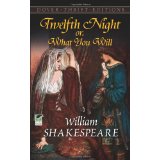setting & sources of the play

Illyria, the setting of Twelfth Night, is important to the play's romantic atmosphere. Illyria was an ancient region of the Western Balkans whose coast (the eastern coast of the Adriatic Sea which is the only part of ancient Illyria which is relevant to the play) covered (from north to south) the coasts of modern day Slovenia, Croatia, Montenegro and Albania. It included the city state of the Republic of Ragusa which has been proposed as the setting. Illyria may have been suggested by the Roman comedyMenaechmi, the plot of which also involves twins who are mistaken for each other. Illyria is also referred to as a site of pirates in Shakespeare's earlier play, Henry VI, Part 2. The names of most of the characters are Italian but some of the comic characters have English names. Oddly the "Illyrian" lady Olivia has an English uncle, Sir Toby Belch. It has been noted that the play's setting also has other English allusions such as Viola's use of "Westward ho!", a typical cry of 16th-century London boatmen, and also Antonio's recommendation to Sebastian of "The Elephant" as where it is best to lodge in Illyria; The Elephant was a pub not far from the Globe Theatre.
The play is believed to have drawn extensively on the Italian production Gl’ingannati (or The Deceived Ones), collectively written by the Accademia degli Intronati in 1531. It is conjectured that the name of its male lead, Orsino, was suggested by Virginio Orsini, Duke of Bracciano, an Italian nobleman who visited London in the winter of 1600 to 1601.
The actual Elizabethan festival of Twelfth Night would involve the antics of a Lord of Misrule, who before leaving his temporary position of authority, would call for entertainment, songs and mummery; the play has been regarded as preserving this festive and traditional atmosphere of licensed disorder. This leads to the general inversion of the order of things, most notably gender roles. The embittered and isolated Malvolio can be regarded as an adversary of festive enjoyment and community, led by Sir Toby Belch, "the vice-regent spokesman for cakes and ale" and his partner in a comic stock duo, the simple and constantly exploited Sir Andrew Aguecheek.
Viola is not alone among Shakespeare's cross-dressing heroines; in Shakespeare's theatre, convention dictated that adolescent boys play the roles of female characters, creating humour in the multiplicity of disguise found in a female character who for a while pretended at masculinity. Her cross dressing enables Viola to fulfill usually male roles, such as acting as a messenger between Orsino and Olivia, as well as being Orsino's confidant. She does not, however, use her disguise to enable her to intervene directly in the plot (unlike other Shakespearean heroines such as Rosalind in As You Like It and Portia in The Merchant of Venice), remaining someone who allows "Time" to untangle the plot. Viola's persistence in transvestism through her betrothal in the final scene of the play often engenders a discussion of the possibly homoerotic relationship between Viola and Orsino. Her impassioned speech to Orsino, in which she describes an imaginary sister who "sat like patience on a monument, / Smiling at grief" for her love, likewise causes many critics to consider Viola's attitude of suffering in her love as a sign of the perceived weakness of the feminine.